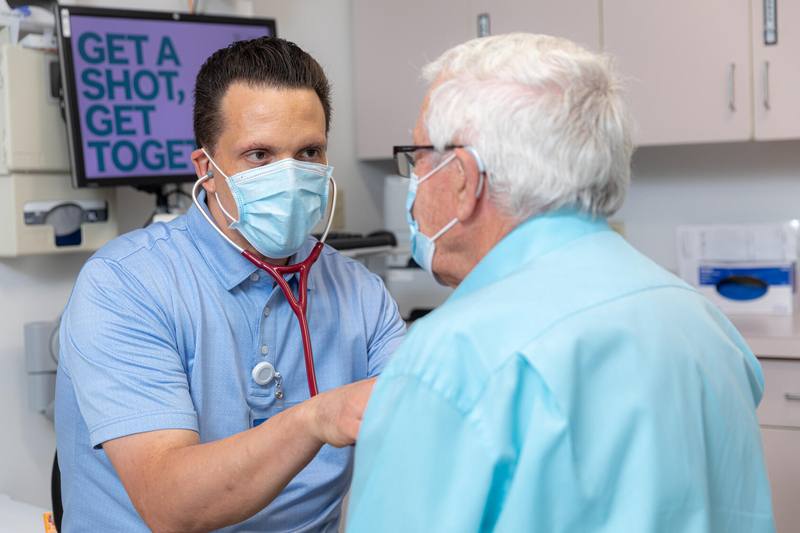-
Cancer
Primary care clinicians adjust recommendations for colorectal cancer screening to accommodate patient needs and preferences, study finds

ROCHESTER, Minn. — Colorectal cancer is the second-most frequent cause of cancer-related deaths in the U.S. Despite the availability of several effective screening tests, colorectal cancer screening rates remain below national goals. "Nearly one-third of eligible adults in the U.S. are not up to date on colorectal cancer screening, and even lower rates have been observed among populations that are traditionally underserved," says Lila Rutten, Ph.D., a health services researcher at Mayo Clinic and the study’s lead author.
Research has shown that the recommendations of primary care clinicians and gastroenterologists strongly influence whether patients are screened and what type of screening they choose – direct visualization, such as colonoscopy, or noninvasive options, such as stool-based screening. To better understand health care providers’ preferences and practices with regard to colorectal cancer screening, the researchers developed a survey that was administered online in late 2019 and completed by 779 primary care clinicians and 159 gastroenterologists.
According to the survey, colonoscopy was the most frequently preferred option for average-risk patients, favored by 96.9% of gastroenterologists and 75.7% of primary care clinicians. “Interestingly, we found that nearly 1 in 4 primary care clinicians in our study selected a stool-based test as their preferred screening option, with multitarget stool DNA selected more frequently than either fecal immunochemical test or guaiac-based fecal occult blood test,” says Rutten.
While colonoscopy is the most often recommended screening method, a new Mayo Clinic study finds that preferences of primary care clinicians shifted toward noninvasive options in general and particularly for patients who were unwilling to undergo invasive procedures; concerned about taking time from work; unconvinced about the need for screening; or refused other screening recommendations. The research, published in Mayo Clinic Proceedings, suggests that although health care providers prefer colonoscopy for screening, they recognize the need to tailor recommendations to the needs and preferences of patients.
"With the availability of multiple screening options with distinct benefits and drawbacks related to effectiveness, access, cost, risk and patient acceptability, it is critical to encourage informed choice and shared decision-making between patients and their health care providers," says Rutten.
"These findings suggest that primary care clinicians recognize the need to tailor their colorectal cancer screening recommendations to the preferences of their patients, especially with the emergence of new, less invasive options," says Paul Limburg, M.D., a gastroenterologist at Mayo Clinic and the study’s senior author.
The study notes that previous research has demonstrated that the common practice of recommending colonoscopy only may reduce the number of patients who undergo screening, particularly among racial and ethnic minorities, and that offering noninvasive screening options is associated with greater adherence to testing. "The availability of multiple screening options with differing test attributes and patient acceptability highlights the need for health care providers to share accurate information about all available options to support informed choice and shared decision-making, so that more patients initiate and follow through with their preferred CRC screening strategy," Dr. Limburg says.
The study was funded in part by Exact Sciences, based in Madison, Wisconsin, and by the Mayo Clinic Robert D. and Patricia E. Kern Center for the Science of Health Care Delivery. The funding agreement ensured author independence in developing the survey, interpreting and analyzing the data, and producing the article. Dr. Limburg is chief medical officer for screening at Exact Sciences through a contracted services agreement with Mayo Clinic, and Dr. Limburg and Mayo Clinic have contractual rights to receive royalties through this agreement. Four co-authors also have potential competing interests with Exact Sciences. Rutten serves as a scientific advisor to Exact Sciences through a contracted services agreement with Mayo Clinic. All other authors report no potential competing interests.
###
About Mayo Clinic Proceedings
Mayo Clinic Proceedings is a monthly peer-reviewed journal that publishes original articles and reviews on clinical and laboratory medicine, clinical research, basic science research, and clinical epidemiology. The journal, sponsored by the Mayo Foundation for Medical Education and Research as part of its commitment to physician education, has been published for 95 years and has a circulation of 127,000.
About Mayo Clinic
Mayo Clinic is a nonprofit organization committed to innovation in clinical practice, education and research, and providing compassion, expertise and answers to everyone who needs healing. Visit the Mayo Clinic News Network for additional Mayo Clinic news. For information on COVID-19, including Mayo Clinic's Coronavirus Map tracking tool, which has 14-day forecasting on COVID-19 trends, visit the Mayo Clinic COVID-19 Resource Center.
Media contact:
- Jay Furst, Mayo Clinic Public Affairs, newsbureau@mayo.edu







